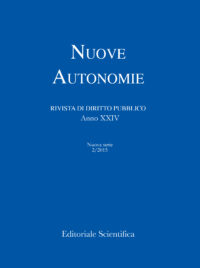
Fascicoli 2/2015
INDICE
DOTTRINA
Salvatore Raimondi – Opportunità e contraddizioni dell’autonomia siciliana – 209
Stefano Agosta – Il recente riordino delle autonomie locali siciliane alla prova dei fatti: fra nodi ancora da sciogliere ed un’auspicabile inversione del metodo riformatore per il futuro – 219
Bruno Di Giacomo Russo – La legge n. 56/2014 e i diversi tipi di provincia – 233
Daniela Belvedere – La tutela precauzionale dell’ambiente e il ruolo della giurisprudenza nel riconoscimento del rischio da fattori inquinanti – 259
Simona Polimeni – Un imprevedibile circuito virtuoso: disciplina sull’immigration regime ed esigenze di sviluppo locale (Notarella a margine della L. reg. calabrese n. 18/2009) – 271
Abstracts
The Special Autonomy of the Sicilian Region: Opportunities and Contradictions
of Salvatore Raimondi
In 1946 the Sicilian Statute was an authentic masterpiece, however today it looks more like a piece of legal archeology. The paper, in particular, illustrates the emptying of the regional legislative competences. Agriculture is, since a long time, regulated by the European Union. Industry is an emptied competence because the industrial policy requires funds that are nowadays unavailable; moreover the companies tend to move to countries where labor costs are lower. Trade falls within the scope of competition, and it is therefore subtracted from the regional competence. The legislative powers have also been reduced by the case law of the Constitutional Court. Furthermore the author stigmatize the mentality of regional public officials, whose main concern, when dealing with instances of economic operators, is to avoid responsibility. The constitutional reform under discussion in Parliament envisages an obligation to adapt the Statute to the new structure. The author states that the special autonomy should be preserved because it provides advantages in tax matters.
Local Sicilian self-government reform in action: open questions and reformer method coming reversal
of Stefano Agosta
Most important matters set by Sicilian law (no. 8/2014 and 15/2015) after Sicilian Districts cancellation are five: so, in particular, government’s levels, lands borders, administrative functions, provincial workers, provincial tax and outgoings different distribution. A first and short examination shows that new Sicilian law does not satisfy Sicilian citizenship suffered request of regional administration modernization, spending review and economic resources rationalization. So a best legal rule specially make a method inversion to shorten distance between local needs and their satisfaction.
Law N. 56/2014 and the different types of province
of Bruno Di Giacomo Russo
Law n. 56/2014, first of all defines the Province as a Body that plays the roles of a vast area and, secondly, introduces a functional and legislative differentiation between the Province and the adjoining mountain Province. These differenciations are justified by the different features of the territory where they rise up and the different needs they have to fulfill. What is new about Law “Delrio” is the specific mountain regime of Provinces adjoining with foreign countries, in order to create a system of governance of the mountain. With Judgement n. 50/2015 the Constitutional Court rejects the various matters of constitutionality relating to law n. 56/2014. The Constitutional Court states that the second level model is not illegitimate in itself, thus it needs the support of its jurisprudence. 63 L’intento è quello di ovviare alla proliferazione di Enti, con ambito di area vasta, anche se non coincidenti di norma con territori provinciali e con funzioni di area vasta e in quanto tali astrattamente riconducibili all’Ente allora direttamente rappresentativo, costituzionalmente chiamato ad accogliere, e destinato a ricevere, quelle funzioni, come ad esempio avviene negli ambiti dei servizi dei rifiuti o delle acque.
La legge n. 56/2014 e i diversi tipi di Provincia 257
The role of the Provinces, however, needs to be contextualized within the constitutional framework, considering the intent of modifying it. In judgement n. 50/2015, the Judge of the Constitutional Court reminds that the approval of a draft law for the abolition of Provinces is currently taking place. The aim is to abolish Provinces and deliberately delete any reference to the provincial Body from the Constitution, concluding that Law 56/2014 will serve as a temporary measure in anticipation of the final abolition of the Body. The abolition from the Constitution of any reference to the Province is not to be considered its very abolition. The fact that the bill refers to the abolition of Provinces is not itself a sufficient element to state that the deconstitutionalisation will mean an institution ban by the Legislator. Provinces will survive their own removal, while losing their representative nature and becoming fully available for the regional Legislator, in terms of functions, organization and territorial linkage.
The precautionary protection of the environment and the role of jurisprudence in recognition of the risk from polluting factors
of Daniela Belvedere
The growing interest on environmental protection finds a symptomatic index in the precautionary principle. The use of this principle, justified by scientific uncertainty concerning the causal link, put in evidence the peculiarities of the relationship between science and law. Such relationship affects not only on the level of legislative choices, but also to work on the application of the jurisprudence. In the first direction, the central issue is the evaluation of the translation in normative terms of the precautionary principle,while in the second, are relevant the reasonableness control of the precautionary choices and the possible use direct In particular, the analysis of administrative jurisprudence allows identification of the mode of implementation of environmental protection through a broad interpretation of the precautionary principle and to assess the obligation resulting from this principle, in an attempt to avoid the latter being used to justify measures inhibitor of a particular business or a particular evolutionary process.
